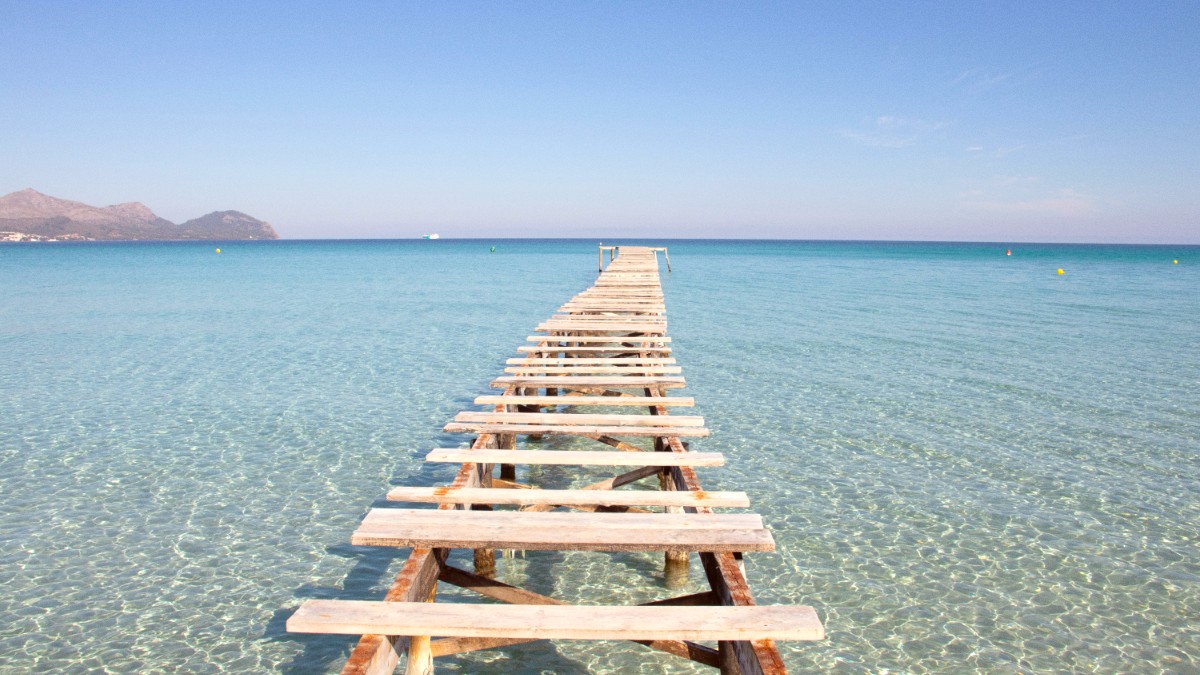
Spain
Alcudia extends beyond a beach vacation; it presents a journey into the heart of Mallorca, blending relaxation with exploration.
Alcudia sits on the northeastern coast of Mallorca, the largest of Spain's Balearic Islands. This prime position presents an unique geographical setting. The town itself rests on a small peninsula, separating two large bays: the Bay of Alcudia to the southeast and the Bay of Pollença to the northwest. This dual bay access provides diverse coastal landscapes, from long, sandy beaches to rugged coves and dramatic cliffs.
Further inland, the flat agricultural plains of Es Pla give way to the foothills of the majestic Serra de Tramuntana mountain range, an UNESCO World Heritage site. This varied geography positions Alcudia as a gateway to diverse activities, from beach relaxation and water sports to hiking and cycling through scenic landscapes.
Alcudia's roots trace back to Roman times, when the city of Pollentia was established in 123 BC by Quintus Caecilius Metellus. Pollentia rapidly became the capital of Roman Mallorca, a flourishing port and administrative hub. Excavations near the modern town display remnants of this Roman past, including a theatre, a forum, and various residential structures. This archaeological site offers a direct link to the island's ancient origins.
Following the Roman era, the town experienced periods of Vandal and Byzantine rule, then prolonged Moorish occupation from the 10th to the 13th centuries. The Moors left a lasting legacy. In 1229, King James I of Aragon conquered Mallorca. During this period, in the 14th century, the impressive medieval walls encircling Alcudia Old Town found construction. These walls, largely intact today, served as protection against pirate raids. The Old Town's gates, like Porta des Moll and Porta de Mallorca, are testaments to this defensive past. Alcudia's history of resilience, its blend of Roman foundations, Moorish influences, and medieval fortifications, makes exploring its streets akin to stepping back in time. This deep historical background builds layers of interest for your visit.
Romans found Pollentia, capital of Roman Mallorca.
Moorish occupation, influencing language, agriculture, and architecture.
King James I of Aragon conquers Mallorca, Christian rule begins.
Construction of the medieval walls around Alcudia Old Town.
Walls serve as protection against constant pirate raids.
Alcudia truly presents experiences for everyone, marking it as a highly versatile travel destination. It gains recognition for its beautiful beaches, especially the long, shallow stretches of Playa de Alcúdia and Playa de Muro, which ideally suit families with children. These beaches feature clear, calm waters and a variety of water sports.
Alcudia's medieval Old Town is a major draw. Its well-preserved walls invite visitors to walk along their ramparts, enjoying panoramic views. Inside, pedestrianized cobbled streets lead to charming squares, traditional shops, and local restaurants. The Roman ruins of Pollentia, just outside the walls, complement the historical picture.
Alcudia is a premier destination for active travelers. Its flat coastal roads and challenging mountain ascents nearby make it a magnet for cyclists. Hikers find numerous trails on the La Victòria peninsula and in the accessible Serra de Tramuntana. Birdwatchers flock to S'Albufera Natural Park, a significant wetland area.
In essence, Alcudia combines historical exploration, natural beauty, active pursuits, and family-friendly amenities into one inviting package.
For dining, Alcudia presents a spectrum, from authentic Majorcan cuisine in the Old Town to international fare along the Port d'Alcúdia promenade. Nightlife is a relaxed feel, centered around family-friendly entertainment and a few lively bars in the port area.
The varied geography means Alcudia positions itself as a gateway to diverse activities, from beach relaxation and water sports to hiking and cycling through scenic landscapes.
Explore stunning trails in Serra de Tramuntana or cycle coastal roads.
Wander through ancient Roman ruins and medieval town walls.
Enjoy long sandy beaches and clear, calm waters, ideal for families.
The island's climate, typically Mediterranean, brings warm, dry summers and mild winters, rendering it an appealing destination for much of the year.